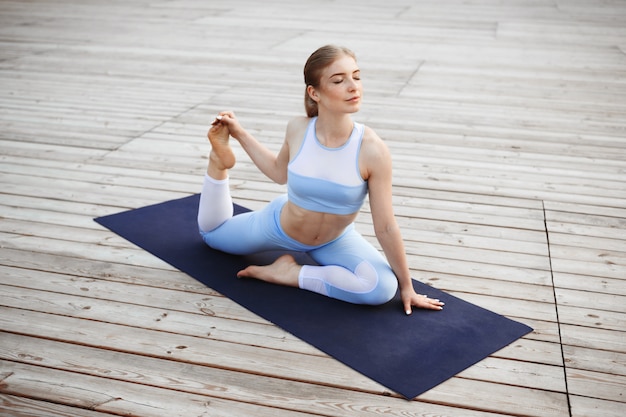
A yoga body isn’t just about flexible limbs. According to Anna Magee, practicing yoga can also improve memory, heart, and bone health.
Yoga has become incredibly popular in the UK, with people spending around £790 million a year on classes and mats. While some new trends in yoga might seem strange—like rage yoga, naked yoga, or poses on paddle-boards or horseback—the real benefits of yoga are supported by science.
Research from UCLA has shown that a three-month course of yoga and meditation is more effective than memory exercises for reducing age-related brain impairment. Another study found that yoga improved sleep in breast cancer survivors.
Lucy Edge, 53, a former advertising executive, turned to yoga during a deep depression instead of taking prescribed anti-depressants. She took a six-month career break, traveled to India to learn yoga, and came back feeling happier with a new sense of contentment. Lucy has since written three books on yoga and founded Yoga Meds, a part of her website that lists clinical trials showing yoga’s benefits for various conditions.
If you’ve been doing crossword puzzles and Sudoku to train your memory, you might want to try yoga. UCLA research on adults over 55 found that yoga and meditation improved spatial and visual memories, reduced depression and anxiety, and increased resilience to stress.
You don’t need to do headstands for hours to benefit. The study participants did one hour of Kundalini yoga per week, which includes gentle poses, breathing techniques, and meditation. They also did 20 minutes daily of Kirtan Kriya, a type of meditation involving chanting, hand movements, and visualization of light.
Walking or jogging are often recommended for heart health, but yoga can be equally beneficial. A review in the European Journal of Preventative Cardiology found that yoga may lower the risk of heart disease as much as conventional exercise. Stress, a major heart disease contributor, can be reduced through yoga, which in turn helps lower blood pressure and heart rate.
For beginners, gentle yoga styles like Hatha or Iyengar are great starting points. If you have specific conditions like back pain, consult your doctor to see if you are eligible for subsidized yoga through an exercise referral scheme.
When choosing a yoga mat, consider where you’ll store it, how often you’ll transport it, and if you need extra cushioning for joints. Healthista recommends the Valka Yoga Elephant Cork Yoga mat, which is eco-friendly, durable, and 3mm thick for joint protection. Cork mats are also antimicrobial and become grippier when wet.
Yoga blocks can also enhance your practice by helping you maintain poses. Cork blocks, though heavier, provide better stability and grip than foam.
No matter your flexibility, yoga can help. Try classes like Yin or Restorative yoga for deep relaxation, Vinyasa Flow for a more energetic practice, or Iyengar for precise poses and alignment. Other options include Anusara yoga for a fun, music-filled experience, and Yoga Therapy for healing specific injuries or illnesses.
Explore different styles and find what works best for you. Overall, yoga offers various physical and mental benefits that can vastly improve your well-being.